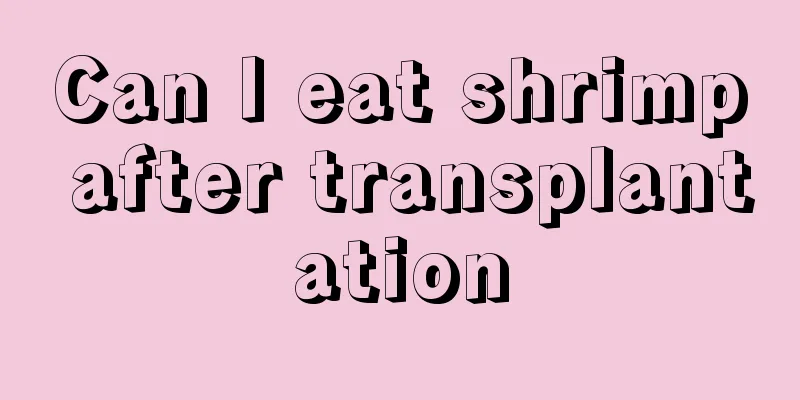Can I eat shrimp after transplantation

|
Test tube transplantation can be understood as a means of helping women become pregnant. Because many people cannot conceive naturally, they have to resort to scientific means to become prospective parents. It is worth our attention. The success rate of test tube transplantation is not 100%, and various preparations before and after the transplantation may affect the results of the transplantation. Can I eat shrimp after IVF transplantation? Most seafood foods are cold in nature and can easily cause allergies, especially crabs and turtles, which should be avoided. Specific attention is as follows: 1. Choose an easily digestible diet After the test tube transplant surgery, you need to stay in bed to rest, which reduces the amount of exercise, leading to decreased appetite and indigestion. Therefore, you should choose easily digestible foods. Such as drinking some rice porridge, stew and other foods that aid digestion. 2. Avoid constipation During in vitro fertilization, progesterone drugs are used to relax the intestinal muscles and slow down intestinal motility. Coupled with bed rest and lack of exercise, constipation can easily occur. In order to prevent or alleviate the symptoms of constipation, you can eat more foods rich in dietary fiber such as celery, cabbage, celery, lotus root, yam, etc. to promote defecation. In addition, eating a proper amount of coarse grains can also promote bowel movements. Eat less spicy food. 3. Avoid diarrhea Due to limited medical conditions, test tube transplantation may be performed in a different location. Therefore, before and after the transplantation, you may have to stay in a hotel near the hospital and eat fast food. It is also easy to have problems with acclimatization, so you need to pay more attention to your diet. To avoid diarrhea, it is best to choose clean and tidy restaurants when eating, rather than small restaurants with no hygiene guarantees. 4. Avoid eating foods that may cause allergies People with allergic constitutions are prone to allergies to pollen, metals, drugs, etc., so they are also prone to allergies after in vitro fertilization transplantation. So in terms of diet, you should not eat seafood and other foods that are prone to cause allergies; in addition, to avoid allergies, expectant mothers should be aware of their allergens and stay away from them. 5. High-protein diet Before the test tube transplant, the doctor will use ovulation-stimulating drugs to promote ovulation. Due to the excessive stimulation of the ovaries by the drugs, the patient will experience discomfort such as abdominal distension. At this time, try to eat high-protein, easily digestible foods, preferably small meals, and control salt intake appropriately. For example, you can eat tofu, eggs, yogurt, etc. |
<<: Anti-inflammatory drugs for dorsal nerve swelling
>>: Can I eat beef after transplantation
Recommend
Can malignant ovarian cancer cause ascites?
Can malignant ovarian cancer cause ascites? Ovari...
What are the early symptoms of tongue cancer
In recent years, cancer has become a high-inciden...
How can low-carbohydrate weight loss methods be more effective
Losing weight is a dream that many female friends...
Thiofuramide precautions
People who don’t do farm work may not be familiar...
I feel exhausted after eating
Most people think that feeling weak all over the ...
What are the methods for diagnosing lung cancer in the elderly? 10 methods for diagnosing lung cancer in the elderly
Lung cancer is a disease whose symptoms are not v...
What is the relationship between prostate cancer and the six factors that cause prostate cancer? Detailed description
In fact, prostate cancer is a malignant tumor tha...
What is respiratory failure?
If respiratory failure is not treated promptly an...
Exercise can prevent prostate cancer
Exercise is not only good for the heart, it's...
How to effectively treat non-atrophic gastritis?
The occurrence of atrophic gastritis requires sci...
There is white stuff in the tonsil fossa
The white stuff in the tonsillar fossa is actuall...
What should we pay attention to when we have heat urticaria?
Heat urticaria is a common type of urticaria. Its...
What are the symptoms of testicular cancer in men
The main symptoms of testicular cancer in men inc...
Adolescent's heart suddenly stabbed
Teenagers are generally healthier both physically...
Are muscles made of protein?
Many people want to have strong muscles. Not only...









